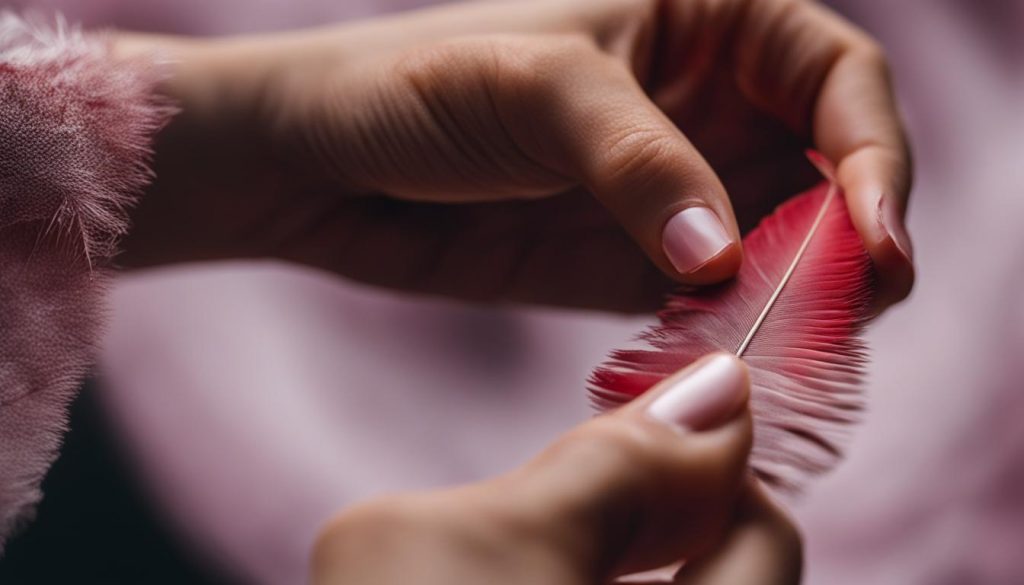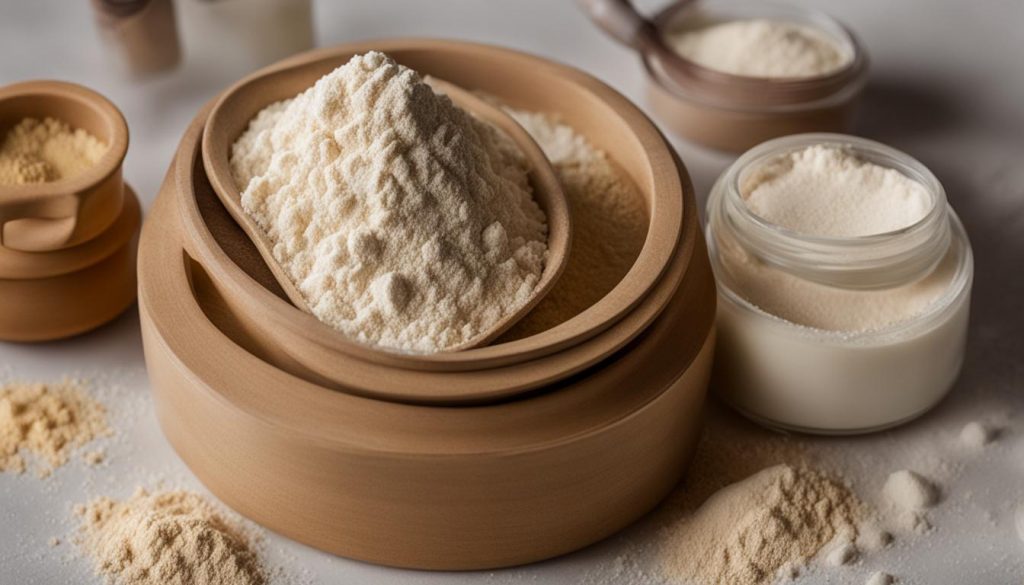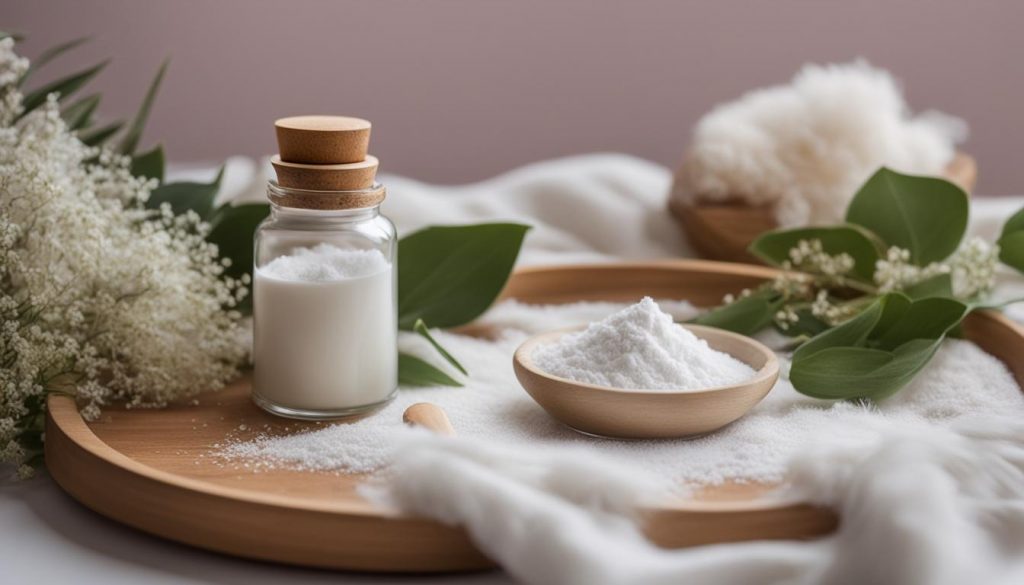When it comes to caring for your baby’s delicate skin, you want to ensure that every product you use is safe, gentle, and effective. That’s why many parents are turning to cornstarch baby powder as a natural and talc-free alternative to traditional baby powders. Made from a food substance, cornstarch baby powder offers a range of benefits for your little one, without any of the potential risks associated with talc-based powders.
Whether your baby has sensitive skin or you simply prefer non-toxic and hypoallergenic options, cornstarch baby powder is the perfect choice. With its moisture-absorbing properties, it helps keep your baby’s skin dry, preventing diaper rash and chafing. Plus, with options like organic and fragrance-free powders, you can further customize your baby’s skincare routine to meet their unique needs.
Key Takeaways:
- Cornstarch baby powder is a safe and gentle alternative to talc-based powders.
- It is made from a food substance and does not contain talc, making it non-toxic and hypoallergenic.
- Cornstarch baby powder helps keep your baby’s skin dry, preventing diaper rash and chafing.
- There are various options available, including natural, organic, and fragrance-free powders.
- Always consult with your pediatrician for personalized recommendations and best care practices for your baby’s sensitive skin.
The Controversy Surrounding Talcum-Based Baby Powder
Talcum-based baby powders, such as Johnson’s Baby Powder, have been at the center of a controversial debate in recent years. The controversy stems from thousands of lawsuits filed by women and their families claiming a link between talcum powder use and ovarian cancer. This alarming issue has raised safety concerns and brought attention to the potential risks associated with talc-based baby powders.
While talc, a naturally occurring mineral, is generally considered safe for cosmetic use, it can sometimes be contaminated with asbestos, a known carcinogen. The presence of asbestos in talcum powder has raised questions about its safety, leading to a wave of lawsuits against companies like Johnson & Johnson. These lawsuits allege that the long-term use of talcum-based baby powder in the genital area can increase the risk of developing ovarian cancer.
The controversy surrounding talcum-based baby powder highlights the need for parents to make informed choices when selecting products for their babies. Many concerned parents have turned to alternative options like cornstarch baby powder, which does not contain talc and is considered a safer choice. It is important for parents to educate themselves about the potential risks associated with talc-based powders and consult with healthcare professionals to make the best decision for their baby’s health and well-being.
In light of the ongoing controversy and litigation surrounding talcum-based baby powders, it is crucial for parents to stay informed and make choices based on the available evidence and expert recommendations.
The Benefits of Cornstarch Baby Powder for Infant Hygiene
Cornstarch baby powder offers several benefits for infant hygiene. Its primary function is to absorb moisture, making it an effective tool in preventing diaper rash. The powder creates a dry barrier on the baby’s skin, reducing friction and preventing chafing. This gentle care helps to keep the baby’s delicate skin dry and comfortable throughout the day.
Moisture absorption is a key advantage of cornstarch baby powder. By keeping the baby’s skin dry, it reduces the likelihood of irritation and the formation of rashes. This is particularly important in the diaper area, where moisture can become trapped, leading to discomfort and potential skin issues.
Beyond moisture absorption, cornstarch baby powder also offers a soothing effect. When applied, it can help calm irritated skin and provide relief from itching or redness. The gentle nature of the powder ensures that it is suitable for daily use and poses no harm to the baby’s delicate skin.
Gentle Care for Sensitive Skin
For babies with sensitive skin, cornstarch baby powder is an excellent choice. Its hypoallergenic properties make it less likely to cause allergic reactions or skin irritations. Fragrance-free options are also available for those with sensitive noses or a preference for unscented products. Cornstarch baby powder provides gentle care for even the most delicate skin types, ensuring the baby’s comfort and well-being.
| Benefits of Cornstarch Baby Powder | |
|---|---|
| 1. Moisture absorption | Helps keep baby’s skin dry and prevents diaper rash |
| 2. Chafing prevention | Reduces friction and discomfort caused by moisture |
| 3. Skin dryness | Creates a dry barrier on the baby’s skin |
| 4. Gentle care | Suitable for daily use and suitable for sensitive skin |
Considerations for Infant Care with Cornstarch Baby Powder
When using cornstarch baby powder for infant care, there are important considerations to keep in mind to ensure the safety and well-being of your baby. One key concern is the risk of respiratory problems if the powder is inhaled. Infants have delicate respiratory systems, and inhaling the powder can lead to discomfort and potentially serious health issues.
To minimize the inhalation risk, it is crucial to follow proper application methods. First, pour a small amount of powder into your hand or onto a clean surface. This helps control the amount of powder and prevents accidental spillage near the baby’s face. Then, using your hands, gently apply the powder to the areas of the baby’s body that need it, such as the diaper area or areas prone to chafing.
Pediatric recommendations also emphasize the importance of using cornstarch baby powder sparingly. Excessive use of the powder can increase the risk of inhalation and other respiratory issues. It is best to use a small amount, focusing on areas that require moisture absorption or protection. Consulting with a pediatrician can provide personalized recommendations based on your baby’s specific needs and health considerations.
The table below summarizes the considerations for infant care with cornstarch baby powder:
| Considerations | Recommendations |
|---|---|
| Inhalation Risk | Avoid inhalation by pouring small amounts away from the baby’s face and using your hands for application. |
| Application Methods | Gently apply the powder to the desired areas using your hands, focusing on areas that require moisture absorption or protection. |
| Pediatric Recommendations | Consult with a pediatrician for personalized recommendations based on your baby’s specific needs and health considerations. |
Hypoallergenic Alternatives for Sensitive Skin

For babies with sensitive skin or allergies, it is essential to choose baby powder that is hypoallergenic and fragrance-free. These alternatives are specifically formulated to minimize the risk of allergic reactions or skin irritations, providing gentle care for even the most delicate skin types. Hypoallergenic baby powders are designed to be free from common allergens, such as fragrances and harsh chemicals, making them safe and suitable for babies with sensitive skin.
By opting for hypoallergenic baby powder, parents can ensure that their little ones are not exposed to potential irritants that could trigger allergic reactions. Fragrances, in particular, can be a common allergen that may cause skin discomfort and irritation for sensitive babies. Using fragrance-free baby powder eliminates this risk and provides a gentle solution for baby’s skincare needs.
It’s important to note that hypoallergenic baby powders are dermatologist-tested and specifically created to minimize skin reactions. These powders usually contain fewer ingredients and are free from dyes, parabens, and other potential irritants. By choosing hypoallergenic options, parents can have peace of mind knowing that they are providing the best care for their baby’s sensitive skin.
Benefits of Hypoallergenic and Fragrance-Free Baby Powder:
- Minimizes the risk of allergic reactions
- Gentle on delicate and sensitive skin
- Provides relief from moisture and helps prevent diaper rash
- Free from fragrances and potential irritants
- Dermatologist-tested and safe for daily use
In summary, for babies with sensitive skin or allergies, hypoallergenic baby powders offer a safe and gentle alternative. These powders are specifically formulated to minimize the risk of allergic reactions and skin irritations. By choosing fragrance-free options, parents can further reduce the potential for discomfort and provide the best care for their baby’s delicate skin.
| Hypoallergenic Baby Powder | Fragrance-Free Baby Powder |
|---|---|
| Formulated to minimize risk of allergic reactions | Does not contain any fragrances or potential irritants |
| Gentle on delicate and sensitive skin | Dermatologist-tested for safety |
| Provides moisture protection and helps prevent diaper rash | Reduces risk of skin discomfort and irritation |
Expert Opinions and Pediatric Recommendations
When it comes to the safety of baby powder, expert opinions and pediatric recommendations play a crucial role in guiding parents. While some experts believe that baby powder, including cornstarch-based options, can be used safely in moderation, others advise against its use altogether. It is important for parents to understand and carefully consider the perspectives of professionals in order to make informed decisions about their baby’s health and well-being.
The American Academy of Pediatrics takes a cautious stance on the use of baby powders, recommending against both talc-based and cornstarch-based powders. Their concern stems from the potential risk of respiratory problems that can arise from the inhalation of powder particles, especially in infants. By following the Academy’s guidance, parents can help minimize any potential health concerns associated with baby powder use.
“Inhalation of powder particles can pose a risk to a baby’s respiratory system, and the potential for respiratory problems outweighs the benefits of using baby powder.” – Dr. Sarah Thomas, Pediatrician
It is always best to consult with a pediatrician for personalized recommendations based on your baby’s individual needs. They can provide guidance on safe alternatives to baby powders and suggest alternative methods for maintaining infant hygiene. Pediatricians may recommend ointments or creams as an alternative to powders, as these options can provide moisture protection without the risk of respiratory issues.
Ultimately, the priority should be the safety and well-being of your baby. By seeking expert opinions and following pediatric recommendations, parents can make informed choices regarding the use of baby powder and ensure the best care for their little one.
Expert Tips for Baby Powder Safety
- Avoid applying baby powder near the baby’s face to prevent inhalation. Use small amounts and keep it away from the baby’s nose and mouth.
- Apply the powder to your hands first and then gently transfer it to the baby’s skin to minimize the risk of powder particles becoming airborne.
- Store baby powder in a cool, dry place and keep it out of the reach of children.
- If you have any concerns or questions about baby powder safety, consult with a pediatrician for expert advice.
Table: Comparing Expert Opinions on Baby Powder Use
| Expert | Opinion |
|---|---|
| Dr. Sarah Thomas | “Inhalation of powder particles can pose a risk to a baby’s respiratory system, and the potential for respiratory problems outweighs the benefits of using baby powder.” |
| Dr. Michael Phillips | “While some baby powders can be used safely, it is important to exercise caution and follow recommended guidelines to minimize potential health risks.” |
| Dr. Emily Johnson | “I advise parents to explore alternative methods for maintaining infant hygiene, such as ointments or creams, which provide similar benefits without the risk of respiratory issues.” |
The Importance of Safety and Application for Baby Powder
When it comes to using baby powder, safety and proper application are paramount to ensure its effectiveness and minimize potential risks. Whether you choose cornstarch baby powder or another alternative, following guidelines and best practices is essential. Here’s what you need to know to use baby powder safely:
Safe Use and Application
The safe use of baby powder starts with carefully reading and following the manufacturer’s instructions. This includes applying the powder in small amounts, away from the baby’s face, to avoid any potential inhalation risks. Remember to keep the powder out of reach of children and store it in a cool, dry place to maintain its quality.
Potential Risks and Correct Usage
It’s important to be aware of the potential risks associated with baby powder, especially if not used correctly. One of the main concerns is the inhalation of the powder, which can lead to respiratory problems, particularly in infants. To minimize this risk, pour the powder away from the baby’s face and your own face, using your hands to gently apply it to the baby’s skin.
While baby powder can be a useful tool for keeping the baby’s skin dry and preventing diaper rash, it’s crucial to use it in moderation. Excessive use can lead to potential respiratory issues, so it’s always best to consult with a pediatrician to determine the appropriate amount for your baby’s needs.
By prioritizing safety and following the correct usage guidelines, you can ensure that baby powder remains a valuable addition to your baby’s skincare routine.
Alternatives to Baby Powder: Making Informed Choices
When it comes to infant care, parents have a range of options to choose from in order to keep their baby’s skin dry and comfortable. In addition to cornstarch baby powder, there are several alternatives available for those who prefer to avoid powders altogether. These alternatives provide similar benefits to traditional powders without the potential risks associated with talc. Let’s explore some of the alternatives:
Ointments:
One alternative to baby powder is ointments, which can provide moisture protection and soothe the baby’s skin during diaper changes. Petroleum-based or zinc oxide-based ointments are commonly used and are often recommended by pediatricians. These ointments create a protective barrier on the baby’s skin, helping to prevent diaper rash and irritation.
Cornstarch Alternatives:
For those looking for non-powder options, there are commercial talc-free baby powders available that utilize alternative ingredients like cornstarch, rice starch, tapioca starch, arrowroot starch, or kaolin clay. These powders offer similar benefits to traditional powders without the potential risks associated with talc. They are designed to keep the baby’s skin dry and prevent diaper rash.
Commercial Powder Options:
Aside from cornstarch alternatives, there are other commercial powder options available that are talc-free and provide gentle care for sensitive skin. These powders often contain natural ingredients and are specifically formulated to minimize the risk of allergic reactions or skin irritations. Fragrance-free options are recommended for babies with sensitive noses or who are prone to allergies.
| Alternative | Benefits |
|---|---|
| Ointments | Moisture protection and soothing for the baby’s skin during diaper changes. |
| Cornstarch Alternatives | Similar benefits to traditional powders without the potential risks associated with talc. |
| Commercial Powder Options | Talc-free and formulated for sensitive skin, minimizing the risk of allergic reactions or skin irritations. |
Conclusion
In summary, cornstarch baby powder serves as a safe alternative for infant hygiene, providing numerous benefits without the potential risks associated with talc-based powders. With its ability to absorb moisture, prevent chafing, and offer gentle care, cornstarch baby powder is a valuable addition to a baby’s skincare routine.
It is important, however, to follow health recommendations and use cornstarch baby powder responsibly. By consulting with pediatricians and adhering to their guidance, parents can ensure the safe and effective use of this product for their babies’ sensitive skin.
In conclusion, cornstarch baby powder stands as a reliable and hypoallergenic choice for infant hygiene. Its gentle formulation and efficacy make it a preferred option for families seeking a natural and safe alternative. By prioritizing the health and well-being of their babies, parents can make informed choices and provide the best care for their little ones.
FAQ
Is cornstarch baby powder a safe alternative to talcum-based baby powders?
Yes, cornstarch baby powder is a safe and gentle alternative to traditional talcum-based baby powders. It does not contain talc and is made from a food substance instead of a mineral.
Are there different types of cornstarch baby powder available?
Yes, cornstarch baby powder is available in various forms, including natural, organic, fragrance-free, and hypoallergenic options.
What are the benefits of using cornstarch baby powder?
Cornstarch baby powder helps keep the baby’s skin dry, soothes irritation, and prevents diaper rash. It creates a dry barrier, reduces friction, and provides a soothing and cooling effect.
Are there any potential risks associated with cornstarch baby powder?
While cornstarch baby powder is generally considered safe, it is important to avoid inhaling the powder, as it can cause respiratory problems, particularly in infants. It is recommended to apply the powder away from the baby’s face and in small amounts.
Are there hypoallergenic options available for babies with sensitive skin?
Yes, hypoallergenic cornstarch baby powders are available. These powders are specifically formulated to minimize the risk of allergic reactions or skin irritations. Fragrance-free options are also recommended for babies with sensitive noses or prone to allergies.
What do experts recommend regarding the use of baby powders?
The American Academy of Pediatrics advises against the use of both talc-based and cornstarch-based baby powders to minimize the risk of respiratory problems and other health concerns. It is best to consult with a pediatrician for personalized recommendations for your baby’s specific needs.
How should baby powder be safely applied?
It is important to follow the manufacturer’s instructions and guidelines when using baby powder. This includes applying small amounts of powder away from the baby’s face and avoiding inhalation. It is best to consult with a pediatrician for proper application methods.
Are there alternatives to baby powder available?
Yes, for parents who prefer to avoid powders altogether, ointments such as petroleum-based or zinc oxide-based options can provide moisture protection. Talc-free baby powders made from alternative ingredients like cornstarch, rice starch, tapioca starch, arrowroot starch, or kaolin clay are also available.





